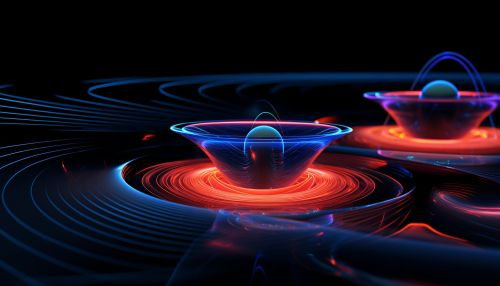The Physics of Quantum Entropy
Introduction
Quantum entropy is a fundamental concept in the field of quantum mechanics, a branch of physics that describes the behavior of particles at the smallest scales. It is a measure of the uncertainty or randomness associated with a quantum state, and plays a crucial role in many areas of quantum theory, including quantum information theory, quantum computing, and quantum thermodynamics.


Quantum States and Entropy
In quantum mechanics, the state of a quantum system is described by a mathematical object called a quantum state. This state contains all the information about the system, but unlike in classical physics, it does not provide a complete description of the system's properties. Instead, the quantum state assigns probabilities to the possible outcomes of measurements of these properties. This inherent uncertainty is a fundamental aspect of quantum mechanics, and is not due to any lack of knowledge or measurement precision.
The entropy of a quantum state is a measure of this uncertainty. It is defined in terms of the density matrix, a mathematical representation of the quantum state. The quantum entropy of a state is given by the formula:
S = -Tr(ρ log ρ)
where Tr denotes the trace (the sum of the diagonal elements of a matrix), ρ is the density matrix, and log is the natural logarithm. This formula is known as the von Neumann entropy, named after the Hungarian-American mathematician and physicist John von Neumann.


Quantum Entropy and Information Theory
Quantum entropy plays a key role in quantum information theory, a field that studies the quantum aspects of information processing. In this context, quantum entropy can be interpreted as a measure of the amount of information that is missing when one has only partial knowledge of a quantum state. This is analogous to the concept of entropy in classical information theory, where it measures the amount of uncertainty or randomness in a random variable.
One of the central results of quantum information theory is the Holevo's theorem, which places a limit on the amount of classical information that can be extracted from a quantum system. This limit is given by the quantum entropy of the system, demonstrating the fundamental role of quantum entropy in the theory of quantum information.


Quantum Entropy and Thermodynamics
Quantum entropy also plays a crucial role in quantum thermodynamics, a field that extends the laws of classical thermodynamics to quantum systems. In this context, the quantum entropy is related to the thermodynamic entropy, which is a measure of the disorder or randomness in a macroscopic system.
The second law of thermodynamics, which states that the entropy of an isolated system never decreases, also holds in the quantum realm. This is known as the quantum second law, and it has important implications for the behavior of quantum systems, including quantum computers and other quantum technologies.


Quantum Entropy and Quantum Computing
In the field of quantum computing, quantum entropy is a key concept that influences the performance of quantum algorithms and the stability of quantum bits, or qubits. Quantum computers use qubits to process information in a fundamentally different way than classical computers. The quantum entropy of a qubit state can affect its coherence, or the ability to maintain a superposition of states, which is crucial for quantum computation.
Moreover, quantum entropy plays a role in quantum error correction, a set of techniques used to protect quantum information from errors due to decoherence and other quantum noise. The ability to control and minimize quantum entropy is therefore a major challenge in the development of practical quantum computers.


Conclusion
Quantum entropy is a fundamental concept in quantum mechanics, with wide-ranging implications in various fields of physics and information science. It captures the inherent uncertainty of quantum states, and plays a crucial role in quantum information theory, quantum thermodynamics, and quantum computing. As our understanding of quantum systems continues to deepen, the study of quantum entropy will remain a vibrant and important area of research.
